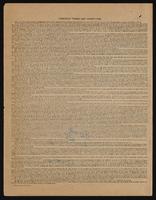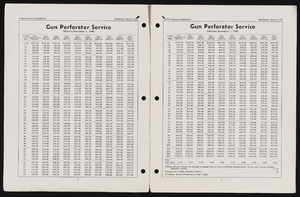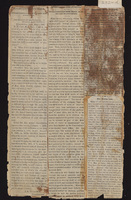Search the Special Collections and Archives Portal
Search Results
Apolonio Sauceda Scrapbooks
Identifier
Abstract
The Apolonio Sauceda Scrapbooks (1973-2010) document Apolonio "Loney" Sauceda's acting career and his work with the Nevada Association for Latin Americans (NALA) in Las Vegas, Nevada. Two scrapbooks document Sauceda's career as an actor and contain photographs of Sauceda on set, at premieres, with other actors, and depict movie sets at well-known Las Vegas hotels and casinos in the 1980s and 1990s. Newspaper clippings accompany many of the photographs and provide details about locations, major actors, or the producers for each film. The third scrapbook is compiled of newspaper clippings that document the local Las Vegas, Nevada Latinx community and NALA events in the 1970s, ranging from political activism, labor strikes, beauty pageants, and religious gatherings.
Archival Collection
George Kelly Ryan Photograph Collection
Identifier
Abstract
The George Kelly Ryan Photograph Collection (1929) depicts waterways in Southern Nevada and Northern Arizona. The collection consists of eight photographic prints and two photographic negatives depicting Saint Thomas, Black Canyon, Boulder Canyon, and the Colorado River.
Archival Collection

Transcript of interview with Carl Ciliax by Gary Wood, March 8, 1980
Date
Archival Collection
Description
On March 8, 1980, Gary Wood interviewed Carl Ciliax (born 1941 in Las Vegas, Nevada) about his experiences living in Nevada. Ciliax first describes his family history, his early interests in wildlife, and his background and education in artwork. Ciliax then discusses his early experiences in hunting and his eventual interest in conservationism and preservation, including his involvement with organizations that sought the protection of desert bighorn sheep and the protection of wildlife in general. The two talk more about wildlife, the early development of Las Vegas, and the effects of the atomic testing. The interview concludes with Ciliax’s recollection of recreational activities and some of his thoughts on conservationism.
Text

Transcript of interview with Joyce Moore by Claytee D. White, January 22, 2013
Date
Archival Collection
Description
Joyce Moore's family moved to Las Vegas from Chicago in 1953, when she was eight years old. She attended Rancho High School, married and had three daughters, and currently lives in Las Vegas. Joyce's father was in the gaming industry and her mother was a nurse. Growing up in Las Vegas meant going to shows with her mother, spending summer days in the pool at the Showboat Hotel, and riding horses to the Last Frontier. While a teenager at Rancho High school, Joyce worked at several movie theaters including the Huntridge, went to school dances and marched in the Hellodorado Parade. After her divorce, Joyce returned to work to support herself and her children, first at the Daily Fax then later on the Strip at the Aladdin and Circus, Circus doing a variety of office and accounting jobs. As a lark she and a friend applied to work as cocktail waitresses at the MGM; she was hired and spent the next five years in a job that was by turns interesting, exhausting, frustrating and fun. This interview covers several periods of Joyce's life - her childhood, teen years, and early adult life - and what it was like to grow up, live and work in Las Vegas in from the mid-1950s until the mid-1970s.
Text

Interview with Nick C. Aquilina, April 6, 2004
Date
Archival Collection
Description
Text

Interview with Marie Elizabeth (Stever; Daly) McMillan, March 5, 2004
Date
Archival Collection
Description
Text

Interview with Erik Thompson, March 4, 2006
Date
Archival Collection
Description
Text



